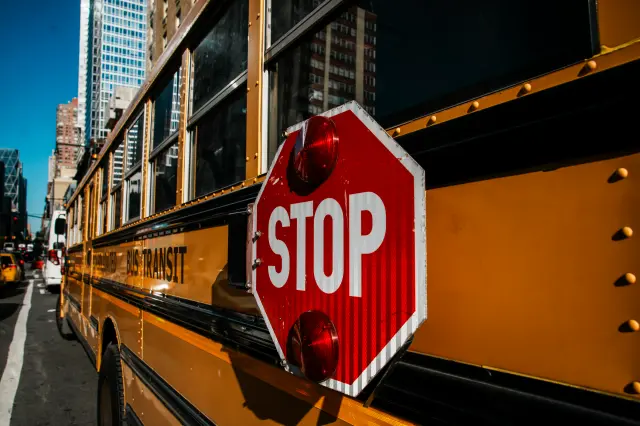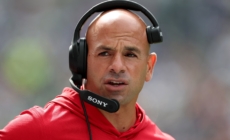-
Judge Allows Policy Restricting Lawmakers’ Access to ICE Facilities - 25 mins ago
-
Jimmy Fallon Teases Trump Over Secondhand Prize - about 1 hour ago
-
After Four Shark Attacks in 48 Hours, Australia Shuts Dozens of Beaches - 2 hours ago
-
U.S. Tells Judge It Will Appeal ICE Restrictions in Minneapolis - 3 hours ago
-
The Chinese Island Where Dreams of Real Estate Glory Never Die - 3 hours ago
-
Titans Reportedly Hiring Robert Saleh as Head Coach - 4 hours ago
-
Trump Issues M.L.K. Day Proclamation After Criticism - 4 hours ago
-
Clashes Erupt Around Syrian Prisons Holding Islamic State Fighters - 5 hours ago
-
Magnitude 4.9 Earthquake Shakes Southern California - 6 hours ago
-
Trump Links His Push for Greenland to Not Winning Nobel Peace Prize - 6 hours ago
Gutting Special Ed Shows How Little America Thinks of Its Children | Opinion
You can tell a lot about a society by how it treats its most vulnerable members—like its children. The ancient Egyptians thought children were gifts from the gods, and that they were protected by deities. Early West African cultures thought children were the reincarnated spirits of their ancestors. The U.S. showed what it thought about its children on December 14, 2012—the day of the Sandy Hook School massacre.
Many of us thought that the image of crying, blood-spattered 6 and 7 year olds, marching-in-train across a school parking lot would finally convince America’s gun owners to concede to meaningful gun reform. Nothing happened. Instead, the shootings continue, and gun violence has grown to become the No. 1 killer of children in America.

A similar indifference seems to inspire President Donald Trump’s recent decision to gut the staff of the U.S. Office of Special Education and Rehabilitative Services, the federal agency responsible for protecting and caring for children with disabilities. The Office of Special Education is tasked with supporting and monitoring state compliance and strengthening special education services covered under the Individuals with Disabilities Education Act (IDEA).
This assistance includes support for children with autism, blindness, deafness, emotional and developmental disabilities and students with orthopedic impairments. The funding pays for paraprofessionals to help children with autism function and adapt to general classroom environments. It pays for braille textbooks, and special computer equipment designed for the blind. It ensures that deaf students have access to teachers with sign language skills. And it pays for specially designed desks and chairs to meet the special orthopedic needs of the disabled. Without such support, millions of children would be unable to access the academic opportunities that all American children are entitled to as citizens of this country.
Under the U.S. Constitution, all Americans, regardless of physical or developmental disability, are guaranteed the right to be educated alongside their non-disabled peers, and receive the same educational access, with the same potential for social engagement as any other student. The IDEA was drafted to protect and ensure these constitutional rights regardless of state or educational institution. It is a law written to specifically benefit students with disabilities and their families, but it provides economic benefits to all Americans in the form of lower taxes.
President Trump justifies gutting the Office of Special Education by telling voters it will save money for taxpayers. What he doesn’t say is that closing the office will shift and concentrate the financial responsibility for disabled children onto states, whose share of these costs will cascade upward as the child grows into adulthood.
If layoffs at the Office of Special Education remain in place, the office’s ability to monitor the constitutional rights of disabled students, and its ability to administer funding to address their needs, will suffer severely. Since a substantial portion of the costs for these services are borne by the federal government, the funding will be shouldered almost entirely by states—which may decide not to provide them. But that doesn’t mean state taxpayers will be off the hook.
Without the financial support administered by the IDEA, which provides resources to teach disabled students to care for themselves, and to function on their own, young people will be unable to get educated, find jobs and become taxpaying members of society. So, in the long run, properly staffing the Office of Special Education ultimately saves money for federal and state taxpayers.
But supporting special education programs has another, intangible, benefit that is available to all Americans regardless of age or physical condition: the emotional well-being of knowing that they live in a country that cares about its children, even though American attitudes toward gun ownership may indicate otherwise.
K. Ward Cummings is an opinion writer and the author of Partner to Power: The Secret World of Presidents and their Most Trusted Advisers.
Anne Tapp Jaksa, Ph.D., is chair of the board of directors of the American Association of Colleges for Teacher Education, and a professor at Saginaw Valley State University.
The views expressed in this article are the writers’ own.
Source link







